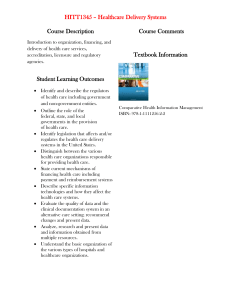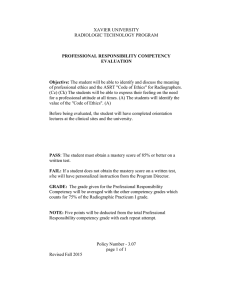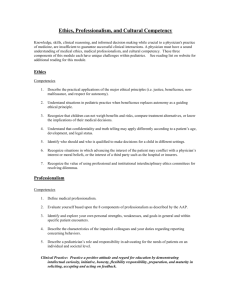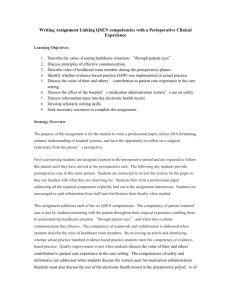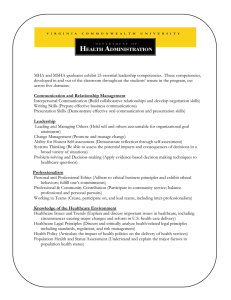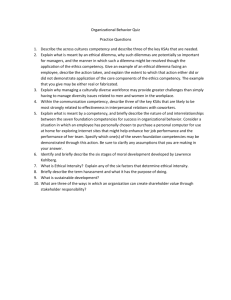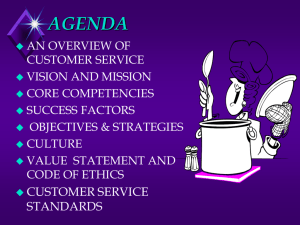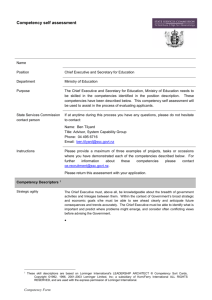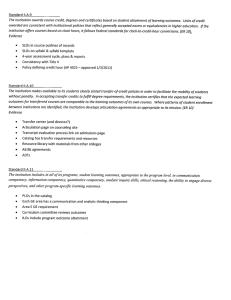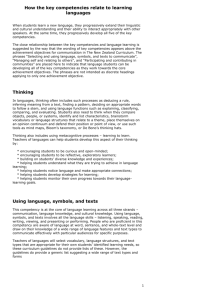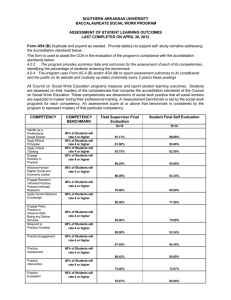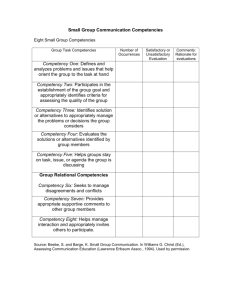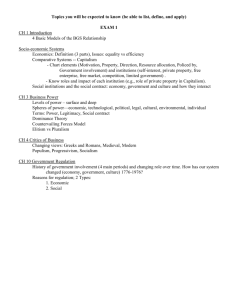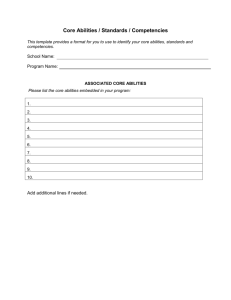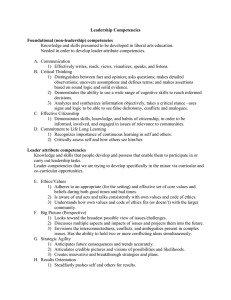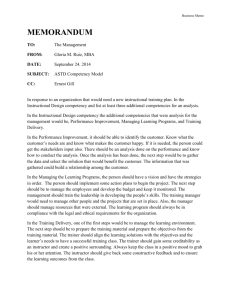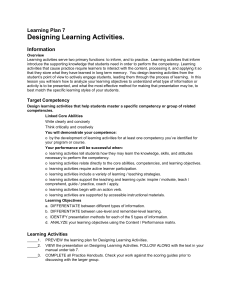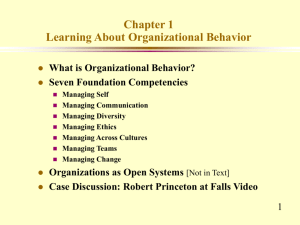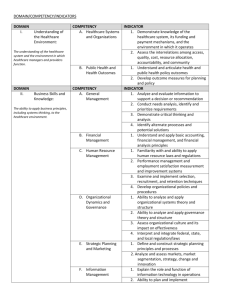Read a more complete description of the competency model
advertisement
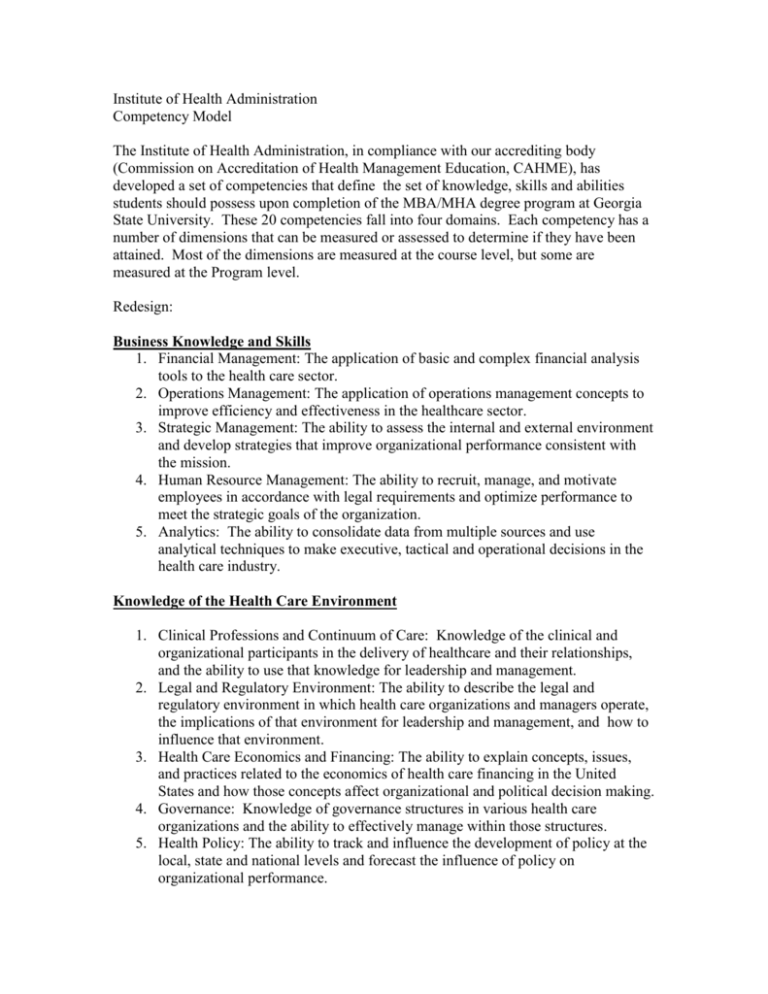
Institute of Health Administration Competency Model The Institute of Health Administration, in compliance with our accrediting body (Commission on Accreditation of Health Management Education, CAHME), has developed a set of competencies that define the set of knowledge, skills and abilities students should possess upon completion of the MBA/MHA degree program at Georgia State University. These 20 competencies fall into four domains. Each competency has a number of dimensions that can be measured or assessed to determine if they have been attained. Most of the dimensions are measured at the course level, but some are measured at the Program level. Redesign: Business Knowledge and Skills 1. Financial Management: The application of basic and complex financial analysis tools to the health care sector. 2. Operations Management: The application of operations management concepts to improve efficiency and effectiveness in the healthcare sector. 3. Strategic Management: The ability to assess the internal and external environment and develop strategies that improve organizational performance consistent with the mission. 4. Human Resource Management: The ability to recruit, manage, and motivate employees in accordance with legal requirements and optimize performance to meet the strategic goals of the organization. 5. Analytics: The ability to consolidate data from multiple sources and use analytical techniques to make executive, tactical and operational decisions in the health care industry. Knowledge of the Health Care Environment 1. Clinical Professions and Continuum of Care: Knowledge of the clinical and organizational participants in the delivery of healthcare and their relationships, and the ability to use that knowledge for leadership and management. 2. Legal and Regulatory Environment: The ability to describe the legal and regulatory environment in which health care organizations and managers operate, the implications of that environment for leadership and management, and how to influence that environment. 3. Health Care Economics and Financing: The ability to explain concepts, issues, and practices related to the economics of health care financing in the United States and how those concepts affect organizational and political decision making. 4. Governance: Knowledge of governance structures in various health care organizations and the ability to effectively manage within those structures. 5. Health Policy: The ability to track and influence the development of policy at the local, state and national levels and forecast the influence of policy on organizational performance. 6. Measurement and improvement of organizational performance and quality: The ability to understand and use quantitative and qualitative methods to measure and improve organizational performance, especially as it relates to health care quality. 7. Health Information Systems and Technology: The ability to understand how technologies shape the health care environment, in particular health information systems (administrative and clinical) and use systems for transformation. Leadership 1. Strategic communications: Skilled in the arrangement and communication of effective message in written and oral form, adjustment to media and setting, and adaptation to reader and audience feedback. 2. Motivation and Empowerment of Others: The ability to explain and evaluate leadership styles, work collaboratively with peers in a manner that respects differences in attitudes, motives, and personalities, and motivate self and others in the work place. 3. Group Participation and Leadership: The ability to lead and participate in a group, manage group meetings, promote group effectiveness, and evaluate group performance 4. Change Management: The ability to lead organizations through dynamic processes or projects and obtain concurrence among people for change. 5. Servant leadership: A commitment to service first that encourages and enables subordinates and coworkers to achieve their full potential. Professionalism 1. Self Regulation, Self Awareness and Self Confidence: The ability create plans, set goals, and participate in processes in a manner that reflects mastery of impulse, the capacity for introspection, and an appropriate recognition of one’s skills and abilities. 2. Ethics, Honesty and Integrity: Knowledge of and commitment to values, standards and duties that are consistent with the ACHE code of ethics and merits trust from all stakeholders. 3. A Commitment to Lifelong Learning: Commitment to continuous personal development beyond formal classroom learning.
